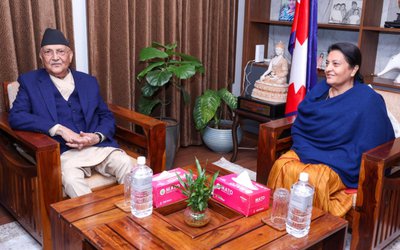The government has recommended withdrawal of 367 cases of criminal nature pending mainly against the activists and leaders of the Unified Communist Party of Nepal-Maoists (UCPN-M) and the Madhes groups. The withdrawal comes parallel to the government move to table an official bill in the parliament defining the powers and scope of the Truth and Reconciliation Commission as well as the Commission on Disappeared, something that should have come into existence by Mid January 2007. Many European countries and the International and local Human Rights Groups have criticised the government --past and present-- for adopting a wishy-washy approach on the rights, jurisdiction and formation of the commission. The government wants to set up the commission as a matter of formality and with a clear objective that none from the UCPN-M should be punished for any kind of human rights violation committed during the years of conflict. This approach is clearly against the understanding reached at the time of signing the Comprehensive Peace Agreement.
To render the proposed commissions totally irrelevant, Bhattarai government withdrew 367 cases in the first phase. Once, this practice is accepted, formation of the commissions will not stop the government from withdrawing remaining cases. Of course, Bhattarai has acted in a brazen manner in the whole context although he has never concealed his intention to absolve all the Maoist activists and leaders against whom there are criminal cases--bordering war crimes--pending. But in the whole process, there is also a dual standard adopted at least by India , United States as well as some European countries visible.
On August 28, Maoist Chief Prachanda and leaders of the United Madhesi Front constituents signed a four point agreement formulating the basis of formation of the coalition government comprising the two sides. One of the points said any case or every case pending against the Maoist and Madhesi activists and leaders would be withdrawn. No doubt, such an agreement does not have the force or a law, but almost all the political parties and international stakeholders mentioned above, welcomed the formation of the government led by Bhattarai expressing hope that the peace process would be completed and constitution drafted during his tenure!
Germany's visiting Parliamentary Secretary Gudrun Kopp not only reminded the government during her visit here recently that mass amnesty was not acceptable, she also gave a clear message to other EU member states that they could not adopt double standards on the human rights violation cases. In a symbolic disapproval of what was then a speculation that the withdrawal of the case was in the offing, Secretary Kopp invited Suman Adhikary, son of Muktinath Adhikary, and Punimaya Lama, widow of Arjun Lama--both brutally murdered by the Maoists, to join her on the dais , while talking to the media. It was no doubt, an extra-ordinary act on the part of a visiting dignitary. But Prime Minister Bhattarai, instead of taking such warnings seriously, responded defiantly, and withdrew the cases as planned, nailing the core values of human rights and rule of law, right on its core. Peace accord was signed to facilitate Maoist Parties transition to a democratic and rule abiding party, and it was in no way meant to establish the Maoists as a 'Party above law'.
Nepali Congress President Sushil Koirala has been given the responsibility to bring about consensus on the provisions of the bill governing functioning and formation of the two commissions. But nothing can move forward in an acceptable and lawful manner without the recent decision of withdrawing 367 cases was annulled by the government. By one single act, not only was Prime Minister Bhattarai reducing the yet to be formed Commissions as 'eye-wash' but he was also sending across a message to the judiciary that the Executive under him would have a binding space above the judiciary.
In Pokhara, Judges Society for the first time, reacted sharply to 'the impending' encroachment on the independence and jurisdiction of the judiciary, and said judges are not going to be taking oath for the same post second time after the promulgation of the new constitution, and that there should be no separate constitutional court, as being advocated by some political parties. Beginning April 2006, the Executive led by G P Koirala clearly interfered in the independence of judiciary by introducing irresponsible and humiliating way of 'parliamentary hearing' of judges for their appointment which was only a way of seeking 'judges commitment' to the changed political context, and dominant political parties. The judiciary, including the apex court, then has erred in delivery of justice on major issues related with the constitution and constitutionalism, an aberration not seen during the previous transition that took place in 1990. But it will be a welcome move if the judiciary took a cue from its own shortcomings and acted in a manner to have its credibility and people’s faith restored in a substantial measure. An independent, fair and impartial judiciary would be the best guarantee against an executive that selectively grants amnesty to criminals belonging to certain political parties.
Prime Minister Bhattarai has tried to give a message time and again that his exit from power will plunge the country into a major crisis. Good citizens can contribute to the well being and development of an orderly society from wherever they are, but a leader with a dictatorial bend of mind will always want to cling to power , and then absolute power. Opposition and independent judiciary pose the biggest obstacle to an authoritarian ambition. That is exactly what Bhattarai is targeting at the moment. In a way, it is good that it did not take less than six months for the revolutionary turned dictator to show his true colour. A leader, after all, needs to be judged not by what he or she says, but by what one does.



